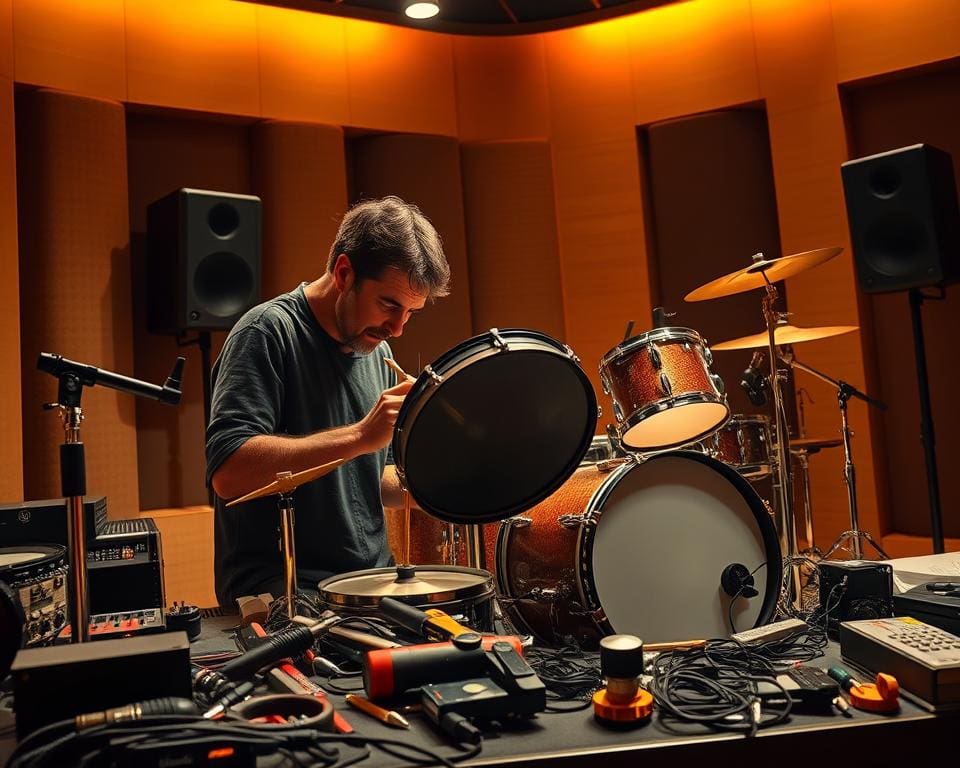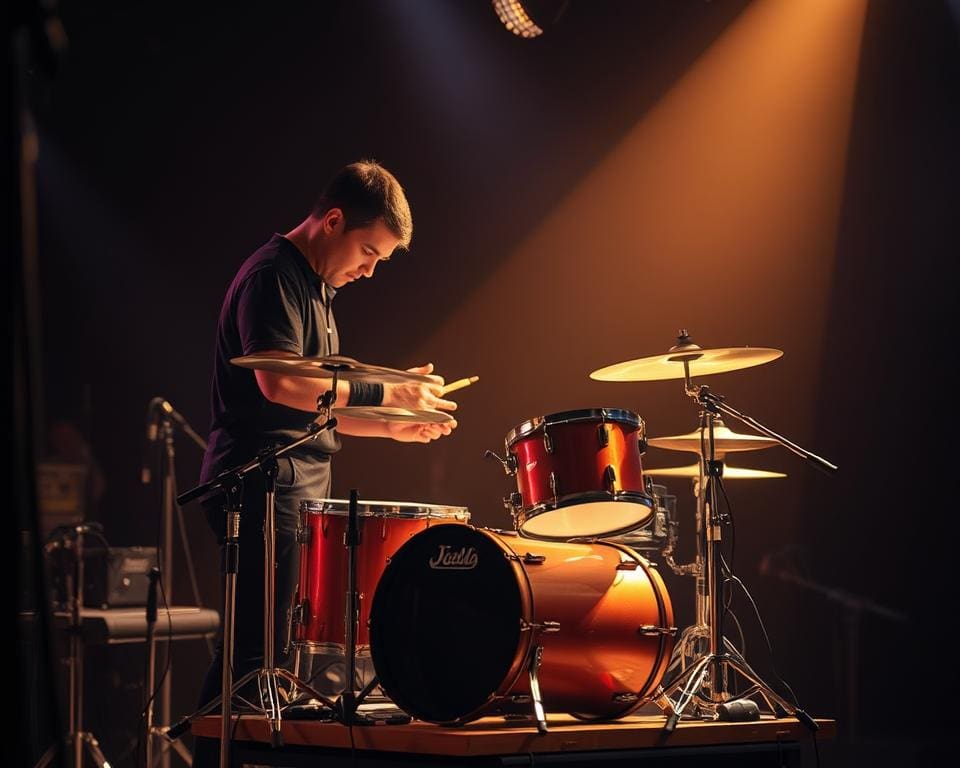A drum tech, short for drum technician, serves as the backbone of a drummer’s performance, ensuring that every beat resonates perfectly. This specialised professional is tasked with the essential care, maintenance, and preparation of a drummer’s equipment before, during, and after live gigs. Understanding the role of a drum tech is crucial; their expertise allows the drummer to focus solely on their art, free from technical distractions. The responsibilities span setting up intricate drum kits to fine-tuning acoustic adjustments, making them an indispensable member of any band or ensemble.
Understanding the Role of a Drum Technician
A drum technician, often referred to as a drum tech, plays a vital role within the music industry, particularly during live performances. This role requires a blend of technical expertise and a passion for drumming. Understanding the definition of a drum tech goes beyond just the responsibilities associated with the position; it encompasses the commitment to ensuring flawless execution of the drumming experience.
Definition of a Drum Tech
The definition of a drum tech highlights an individual skilled in managing the intricate details of drumming equipment. This position demands a deep understanding of drum mechanics and accessories. A drum technician possesses the knowledge required to set up, tune, and maintain various drum instruments effectively, ensuring that each performance runs smoothly. The professionals are adept at addressing equipment-specific issues across numerous brands and models, making them indispensable to any band or artist.
The Importance of a Drum Tech in Live Performances
During live performances, the importance of a drum tech cannot be overstated. Their responsibilities extend beyond mere setup and maintenance; they are essential to the overall performance quality. A drum technician is tasked with ensuring that the sound is not just good, but exceptional. They work tirelessly to implement crucial adjustments and repairs on the spot, allowing musicians to focus on their artistry rather than troubleshooting equipment. The presence of a skilled drum tech elevates the entire concert experience, solidifying their role as a critical asset in the world of live music.

What Is A Drum Tech
A drum tech plays a vital role in ensuring the success of live performances through various essential tasks. The drum technician duties and responsibilities are centred around setting up and maintaining the drum kit, which significantly contributes to the overall sound quality and performance experience.
Overview of Duties and Responsibilities
A drum tech’s responsibilities are diverse and critical for seamless live events. Key drum tech duties include:
- Setting up the drum kit in a timely manner before soundchecks and performances.
- Tuning drums to achieve the desired sound, allowing for optimal performance.
- Managing and maintaining equipment during the show, ensuring everything operates smoothly.
- Handling post-performance tasks, such as breaking down the kit and conducting maintenance checks.
Collaboration with Musicians
Collaboration is at the heart of a drum tech’s role. A drum technician works closely with drummers and other musicians to understand their specific needs and preferences. Effective communication is essential in this relationship, as it allows for adjustments based on the performance environment and musicians’ requests. A successful partnership between the drum tech and the performer can elevate the quality of live music, demonstrating the significant impact of excellent drum technician duties and responsibilities on the overall performance.
Key Responsibilities of a Drum Tech
The role of a drum technician encompasses several vital responsibilities that greatly enhance the drumming experience. From preparing the kit for performances to ensuring optimal sound quality, each task contributes to the overall success of a musical event.
Setting Up and Tuning Drums
One of the key tasks involves setting up drums in a manner that caters to the preferences of the musician. This process includes carefully positioning the drums, cymbals, and hardware for ease of access and comfort. Attention to detail is necessary, as the arrangement can significantly impact performance. Alongside setting up drums, tuning drums accurately is fundamental. This not only affects the tonal quality but also harmonises with the other instruments. A proficient drum tech understands the nuances of different musical styles and can adjust the pitch to meet specific requirements swiftly.
Maintaining Equipment During Performances
During live performances, a drum tech plays a crucial role in maintaining the equipment. Constantly monitoring the setup ensures that any issues are addressed immediately, allowing the musician to focus solely on their performance. The drum tech must be attentive, ready to make adjustments or provide replacements as needed, ensuring an uninterrupted experience for both the performer and the audience.
Repairing Drums and Hardware on Site
Unexpected mishaps can occur at any time, making it essential for a drum tech to possess repair skills. Fixing drums and hardware on site can be a determining factor in a show’s success. With the right tools and expertise, a drum tech can resolve issues efficiently, keeping the performance running smoothly and maintaining the integrity of the sound.
Essential Skills for a Drum Tech
Being an effective drum tech requires a unique blend of skills that ensure optimal performance and sound quality. Possessing strong drum tech skills can set one apart in this competitive field. Professionals must continuously develop their technical proficiency in drums to adapt to various situations and equipment.
Technical Proficiency in Drumming Equipment
Comprehensive knowledge of drumming equipment stands as a cornerstone of a drum tech’s capabilities. Understanding the intricacies of drum anatomy, hardware mechanics, and the effects of different materials on sound is crucial. Those who are well-versed in both acoustic and electronic duelling kits greatly enhance their value, as they can troubleshoot issues quickly and efficiently. This level of technical proficiency in drums fosters the confidence required in high-pressure performance environments.
Problem-Solving Skills Under Pressure
A drum tech often faces challenging situations that demand quick thinking and creative problem-solving. Whether it’s a technical malfunction during a live show or a last-minute equipment change, thriving under pressure is part of the job. Developing strong analytical skills enables a technician to assess problems swiftly and implement effective solutions, ensuring that performances continue smoothly.
Communication and Interpersonal Skills
A drum tech’s responsibility extends beyond equipment management; strong communication skills are essential for effective collaboration with musicians and crew. Building rapport and understanding the needs of drummers helps create an environment conducive to artistic expression. A successful drum tech listens actively, providing feedback and support as necessary, ultimately enhancing the overall performance experience.
Drum Tech Equipment and Tools
The success of a drum technician relies heavily on having access to quality drum tech equipment and the right tools for drum technicians. These essential tools not only enhance the efficiency of the technician but also contribute to the overall sound quality during performances. Investing in high-quality tools can make a significant difference in maintaining and optimising a drum kit.
Essential Tools of the Trade
A well-stocked toolkit for drum technicians typically includes:
- Drum keys for tuning the drums.
- Tuners to ensure proper pitch across the kit.
- Cleaning supplies to maintain the kit’s appearance.
- Replacement parts such as drum heads and sticks.
- Variety of wires for custom setups and repairs.
Technology and Software for Drum Maintenance
In the current age, technology plays a crucial role in the maintenance of drum kits. Software applications enable drum techs to manage setups and track equipment needs efficiently. Advanced tuners and metronomes simplify the tuning process, allowing for precision and ease. Incorporating modern technology alongside traditional tools enhances the effectiveness of drum tech equipment, ensuring the technician is always prepared and the kit performs at its best.
The Drum Tech Job Description
The drum tech job description encompasses a range of responsibilities that ensure a drummer’s equipment is always ready for performance. This role is vital in maintaining the integrity of the sound and reliability needed under various conditions. Understanding the work environment for drum technicians provides insight into the demands of this profession.
Typical Work Environment and Conditions
The work environment for drum technicians varies significantly, including studio settings and live performance venues. Often, they find themselves in dynamic situations that require adaptability and resilience. Long hours are common, with late nights becoming part of the routine. Being on tour adds layers of complexity, as travel involves regularly adjusting to new venues and acoustics. Flexibility and stamina are essential attributes for those pursuing this path.
Career Progression and Opportunities
A career as a drum tech can lead to various exciting opportunities within the music industry. Starting as an apprentice or assistant allows individuals to build crucial skills and experience. As one gains expertise and reputation, advancements may include roles with prominent artists or moving into broader sound technician positions. The drum tech job description evolves, offering a pathway toward leadership roles in audio production and event management.
How to Become a Drum Tech
Embarking on the journey to become a drum tech requires a solid foundation in drumming, music, or audio engineering. Many individuals begin their careers in this field as roadies or assistants, working alongside experienced professionals to gain invaluable hands-on practical experience. This initial exposure is crucial, as it not only enhances technical skills but also offers insights into the intricate workings of drumming equipment and setups.
To bolster one’s qualifications, pursuing drum technician training can be a strategic move. Enrolling in certificate courses in audio technology or sound engineering will provide the specialised knowledge needed to excel in this role. Furthermore, actively seeking networking opportunities within the music community can open doors to many positions in this competitive industry, allowing aspiring drum techs to meet musicians and industry insiders who could potentially lead to job opportunities.
As the music industry continues to evolve, staying updated with new technologies and methods is imperative for those looking to advance. By continually refining your skills and building your professional network, you can set yourself on a path toward becoming a successful drum tech, turning your passion for drumming into a fulfilling career.









